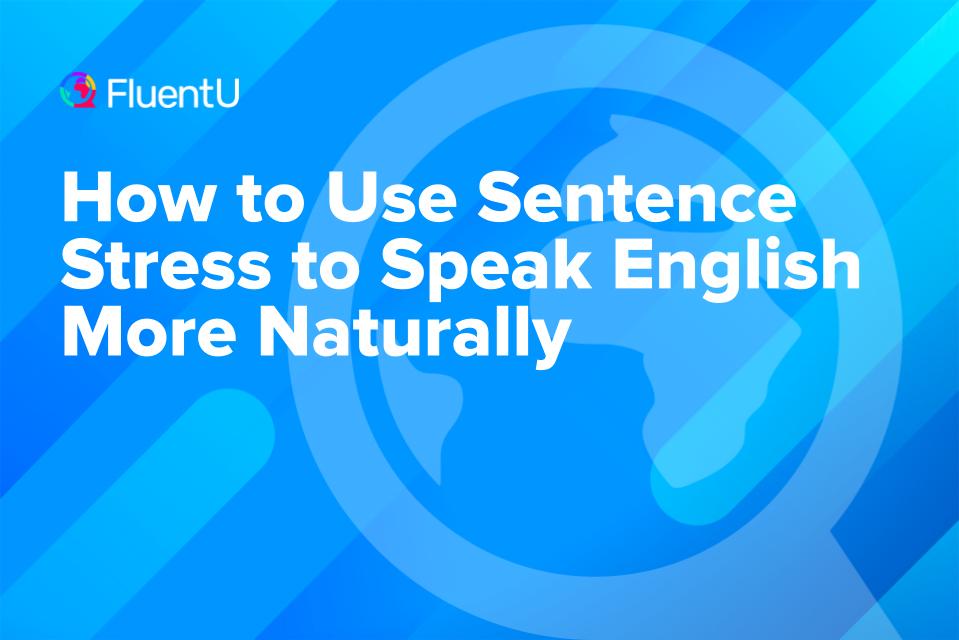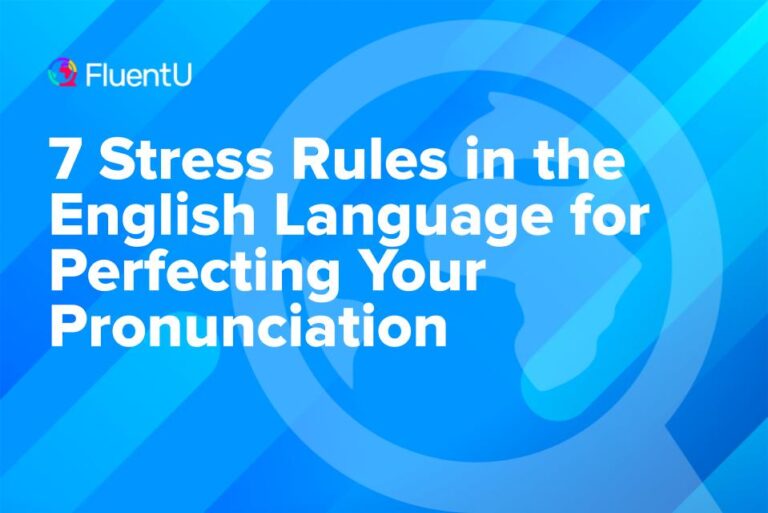How to Use Sentence Stress to Speak English More Naturally

When you’re absorbed in listening to a song, you naturally nod your head or move your body based on the rhythm.
There’s a certain rhythm to speaking English too. It may not be as noticeable as loud drumbeats, but there are certain words in sentences that English speakers emphasize – while other words are said more quietly.
This is called sentence stress. Although people don’t think about it consciously when they’re listening, sentence stress is essential for clear, fluent English, and stressing the wrong words can affect the meaning of your sentence or even make it sound strange.
In this post, we’ll look at what sentence stress is all about, along with how to identify which words to stress in a sentence.
Download: This blog post is available as a convenient and portable PDF that you can take anywhere. Click here to get a copy. (Download)
What is Sentence Stress?
Sentence stress simply means that when you speak English, you put more force or stress into specific words so they stand out. To stress a word, you say it more slowly and loudly, with a higher pitch. In contrast, unstressed words sound quieter and softer, as If you’re drawing attention away from them.
The rhythm of English is created by this shifting from stressed to unstressed words and then back again. In fact, English is a stress-timed language. The stressed words act as a consistent beat, with the unstressed words smushed together in between them.
In other words, the time between stressed words stays the same no matter how many unstressed words there are between them. Because of this, how long it takes you to say a sentence in English depends on the number of stressed words.
Here’s how this would work in a sentence:
- Therewerealotof people atthe meeting today.
The bolded words are stressed, while the regular words are unstressed. Note that the unstressed words (“There were a lot of” and “at the”) are smushed together to keep the beat in the phrases.
This pattern of stressed and unstressed words gives English a distinct melody and rhythm. When you can match the sentence stress of standard English, your speech will be much easier to understand.
How to Identify Sentence Stress
In standard English, the most important words in a sentence are the ones that you stress. This is actually pretty logical because it signals to the listener that you want them to focus on those words.
These words are called content words. They carry the meaning of the sentence. If you remove all of the other words and say only the content words, your speech will sound broken and your grammar incorrect, but the other person can still get a rough idea of what you’re trying to say.
For example:
- I bought a bottle of water from the store.
The content words are bolded here, so if you remove them, the sentence becomes: “bought bottle water store.” Even without half of the words in the sentence, you can still guess the meaning!
In this sentence, the other words are called function or grammar words, including “a,” “of,” “from,” and “the.” These words are the glue that holds the sentence together and makes it grammatically correct, but they can’t stand on their own.
When it comes to sentence stress, content words are usually stressed, while function words are unstressed.
Content Words vs. Function Words
Let’s take a deeper look into what we can consider as content words or function words:
Content Words
Content words are usually nouns, adjectives, adverbs, and verbs.
Examples:
- There isn’t anyone around here.
- Do you need to use my laptop?
- Rainy mornings can be cozy.
- He’s scared about his exam results.
- The company was doing well when I checked.
Function Words
Function words are usually articles, prepositions, conjunctions, pronouns, and be verbs.
Examples:
- We’re excited about watching this movie.
- That’s his most important goal for the year.
- Risk is inherent in everything.
- The view from the mountains is beautiful.
- It might have to be rescheduled.
A quick way to figure out whether a word is a content word or a function word is to ask: if I remove this word, does the sentence still retain its message?
Expressing Yourself with Sentence Stress
Since sentence stress emphasizes the most important part of a sentence, it also gives you more room to be expressive when you speak English. The words that you stress can add a new level of meaning to the sentence.
Although English speakers generally stress content words and unstress function words, there are situations when this isn’t followed. Here’s what happens if we stress specific words compared to others in a sentence:
- We’re excited about watching the movie. -> Focuses on who’s excited to watch the movie (we, not other people)
- We’re excited about watching the movie. -> Focuses on how we feel about watching the movie (excited, not uninterested or bored)
- We’re excited about watching the movie. -> Focuses on the action that we’re excited about (watching the movie, not going hiking or eating outside)
- We’re excited about watching the movie. -> Not as natural, but focuses on the fact that we’re excited about watching a specific movie, not a random movie
- We’re excited about watching the movie. -> Focuses on what we’re excited to watch (the movie, not a TV series or a basketball game)
It’s technically the same sentence, but there are different implications based on which words you emphasize the most! “We” as a subject and “the” usually aren’t stressed, but it’s possible to stress them if you want to make a point. This isn’t done as often, though, so until sentence stress becomes more intuitive for you, you can stick with generally stressing content words.
Practice Sentences
We’ve compiled some sentences for you to practice on! Try reading these out loud while putting stress on the bolded words:
- I’m thirsty. Is there any water?
- The internet isn’t working.
- She passed me the book across the table.
- He didn’t make it to his job interview.
- They found it relaxing to live by the beach.
- There’s a gallery exhibit that features glass sculptures.
- We met at the festival.
- Everyone’s happy because their team won.
- I sent you the document on our group chat.
- What’s your favorite spot in the city?
If your native language doesn’t have sentence stress the way English does, then you can get used to it by reading a diverse range of sentences out loud.
Conclusion
English might not seem like an especially musical language, but a key element of it is rhythm – and part of this comes from sentence stress. Aside from improving your speaking, becoming comfortable with sentence stress will also give you better listening comprehension. Ever get confused when someone speaks English fast? Knowing all about sentence stress can help you with that!
Pronunciation and vocabulary might be the building blocks of English, but beyond those, mastering higher-level concepts such as sentence stress will fine-tune your English communication – both in terms of speaking and listening.







